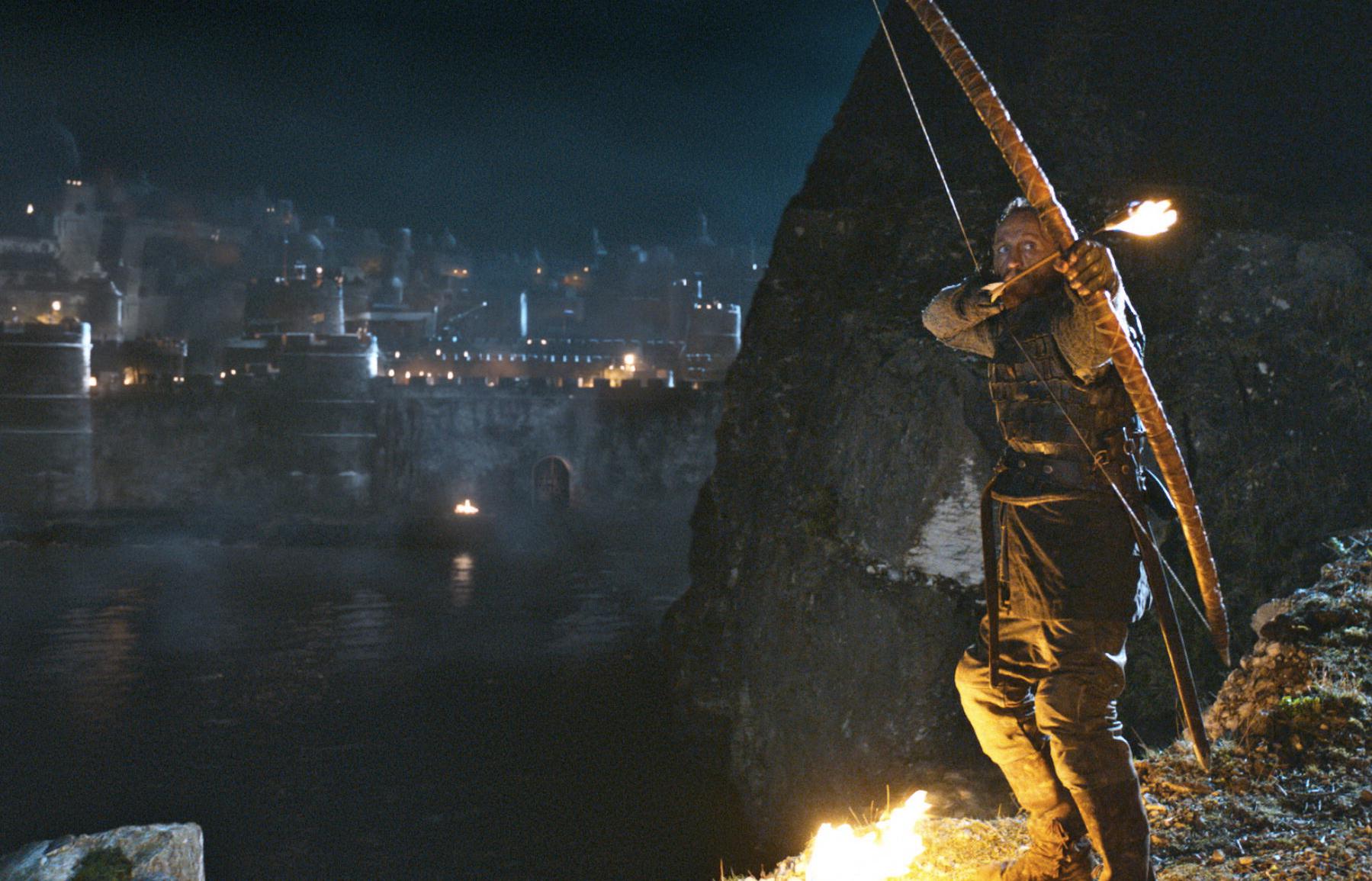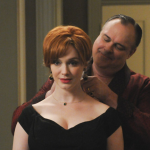“The gods have no mercy, that’s why they’re gods” Cersei Lannister
Hype is a bitch. When a TV show, movie or book (they still print those, don’t they?) is cursed with excessive hype, it’s almost impossible to judge and critique based on its own merits. It finds itself trapped being judged in comparison to its hype. We’ve seen this challenge already with HBO’s other big spring hit, Girls. Almost no review of Girls since the first few (I say Emily Nussbaum got the hype train started and Tim Goodman shoveled coal into the hype engine…I should probably stop this train metaphor before I get off track. Ziiiiiiiing) can say “I like this show because x, y, z,” but rather has to declare whether Girls either lives up to the hype or can’t quite reach it.
But not content to have one hype monster, HBO made every attempt to raise expectations for Game of Throne’s nineteenth episode, “Blackwater.” They released a special poster for the episode, a double-sized episode promo and let D.B. Weiss and David Benioff loose for an Entertainment Weekly interview.
I suppose it makes sense for HBO to not only make sure their hefty investment for one episode of television pays off (it’s by far the most expensive episode of ‘Thrones’ yet) but to also spike the football for pulling off such a grandiose achievement. Unfortunately, it puts all of us in that unenviable position of viewing “Blackwater” in relation to its own hype. So I guess the question is then: does it?
For the most part, I’d say it does. It seems like most of the money was spent on extras and pyrotechnics rather than CGI. But the CGI that appears onscreen is undoubtedly spectacular. The long tease of what Tyrion would do with the city’s supply of “pigshit” a.k.a. wildfire pays off in a big way. Every penny that went into digitally creating the ghostly green explosion was well worth it. And the haunting shot of Bronn’s flaming arrow silently arcing over Davos’ boat is exactly what I want from a war movie/episode and possibly my favorite lone shot of the season thus far.
Still, despite how much I tried to curb my expectations going in, it was hard not to be disappointed with the scale of the battle. As far as I can tell the ultimate battle for the Iron Throne took place on about 25 yards worth of beach. For two armies that number tens of thousand of soldiers combined, it’s a bit of a stretch that they would have enough wiggle room to do anything but stand shoulder to shoulder on the beach, shuffling forward to the castle walls. I imagine tens of thousands of Baratheon soldiers wading around the bay, patiently waiting to enter the melee.
It’s unfair to expect HBO to be able to recreate a battle that takes place on miles of land and water with tens of thousands of but such is the curse of hype. HBO let our minds run wild from Monday to late Sunday, knowing full well that whatever the imagination could create would be far more vast than what their budget could.
Thankfully, “Blackwater” never loses focus of what makes any episode of this show that doesn’t feature a near full scale siege worth watching: humanity. The best part of the Battle of the Blackwater wasn’t the spectacle of war, but rather the small moments of characterization during. Tyrion, Cersei, Sansa and The Hound all have what might be their very best episode. I’m not sure there is any other episode of Thrones were even two characters have their best moments. Hell, I would even throw Stannis in there, had he not monologued everyone’s faces off last week.
The Hound is central to the prevailing theme of “Blackwater” and the season in general. As I rather heavy-handedly discussed in a prior review, the question of “what is power?” has hung over this whole season. And while schemers and plotters have put forward all of their very best theories, “Blackwater” offers the most visceral and disturbing answer: killing.
“You like fucking, and drinking and singing but killing – killing’s the thing you love. You’re just like me,” Sandor tells Bronn towards the episode’s beginning. The Hound sees a like-minded soul in Bronn (which is probably why the self-loathing dog hates him so much) and despite what he says otherwise to shake him probably knows they will both make it through the battle ok. They’re both killers, whether they want to be or not. And for what it’s worth, The Hound does not want to be.
That is what makes his decision to quit mid-battle all the more striking. Sure, he is horrified by the sight of fire…the same element that disfigured his face into a monstrous visage but he doesn’t just flee out of pure terror. He takes a moment to collect himself and then does something that no one else has done thus far in the series: he exits the game of thrones…but not before dropping verbal bombs on Joffrey obviously. “Fuck the king’s guard. Fuck the city. Fuck the king.”
The Hound’s treatise on killing is beautifully bookended by his parting words to Sansa. “Stannis is a killer. The Lannisters are killers. Your father was a killer. Your brother is a killer. Your sons will be killers some day. The world is built by killers. So you better get used to looking at them,” he tells her. It’s a moment that almost changes the perspective on the entire series. There may always be a shortage of “good guys” in Westeros but at least every one seems to be in agreement that Ned was one. Still, how good of a guy can a killer be? His sword is as red as anyone else’s. And now his son and Sansa’s brother has become a killer all the same. It harkens back to Robb’s original scene with Talisa. The boy whose leg she had to amputate had no part in Robb’s war. He didn’t know the king personally but still Robb’s forces had to kill him because this is war after all.
There may not be any “good guys” left in Westeros but Tyrion is quickly becoming something of a hero. He proves to be both a tactical genius this episode and a capable soldier. His rallying speech to the Lannister soldiers will probably end up being the conclusion to Peter Dinklage’s already stacked Emmy reel. Tyrion, probably moreso than any other character understands what motivates men. He makes no appeal to honor, or glory, or duty but instead recognizes that the soldiers are motivated by fear of having their lives and their homes taken from them. Tyrion is a prgamatist and a realist, which is what makes him an effective leader but also a target. Ser Mandon Moore, the Knights Guardsmen who slices Tyrion, certainly wouldn’t make such a drastic move like that without instructions from his king or queen. It will be interesting to see how that reverberates in the finale.
George R.R. Martin, who wrote the script, made the inspired decision to focus on only the action in King’s Landing. For as much as we all love characters like Arya and Jon, it would have been too deflating to move the plot away to the North or Qarth with the central conflict of the season playing out in King’s Landing. Instead the “b-plot” becomes the noble ladies of King’s Landing hiding in Maegor’s Holdfast deep within the Red Keep.
Cersei’s increasingly drunken desperation contrasts perfectly with the bloodshed out on the beach. In fact, Cersei’s reactions give the episode a far better sense of escalation than the battle itself. As she gets drunker and more blunt, we can almost imagine the timer ticking down to the moment where she uncaps that bottle of nightshade to call it quits.
I’m sure some found the ending to be rather abrupt but I found it to be pitch perfect. Cersei’s monologue of the little lion lost in a wilderness of stags and wolves was genuinely touching and as she brought the poison to her son’s lips, I came to realize that I might have a rooting interest in this war. One of the most interesting aspects of the war and one of its biggest differences from other typical fantasy-based narratives is that there was no clear rooting interests. Stannis is a douche but his bearded buddy seems decent enough. He also would undoubtedly be a better king than that sociopath Joffrey. But what would Stannis’ ascent to the throne mean for genuinely good people like Tyrion and Sansa? And would the violence really end? Tywin just decides to call it quits and not reclaim the Throne for House Lannister? Certainly not.
So in that moment, where a mother sat on a throne of conquered swords and prepared to kill her innocent little boy, it became clear that this war just needed to be over, with the incumbent on the Throne. Please gods, old and new, just let it be over because Westeros can’t handle much more. And when Tywin and Loras (looking like an absolute beast in Renly’s armor) kick open the doors and announce conclusively “the battle is over. We have won,” it’s a genuine sigh of relief. The violence is over for now. Tyrion lives (I think). Sansa lives. Tommen lives. Only on Game of Thrones can the most evil little brat in human history still sit on the Iron Throne and that be considered a happy ending. It’s what makes the show unlike almost any other.
BULLET POINTS FROM HERE ON OUT:
- Loved the Saving Private Ryan D-Day scene vibe in Stannis’ fleet.
- What would you rather fight to: bells or drums?
- “Of course you’ll be in the vanguard. They say my brother always goes where the fighting is thickest and he’s just a pretender.” SICK BURN, SANSA.
- More. Drunk. Cersei. Please. I’m tempted to just post every one of her lines. She reminded me of a medieval Lucille Bluth this episode.
- Davos not yelling “IT’S A TRAP!” Admiral Ackbar-style when he saw the wildfire was such a lost opportunity.
- I love Tyrion’s facial expression upon seeing what the wildfire hath wrought. Very Oppenheimer.
- Best gore of the night: Stannis slicing that dudes face in half.
- Speaking of Stannis: kudos to him for going to the heart of the action. That man is really putting in work for the Iron Throne.




